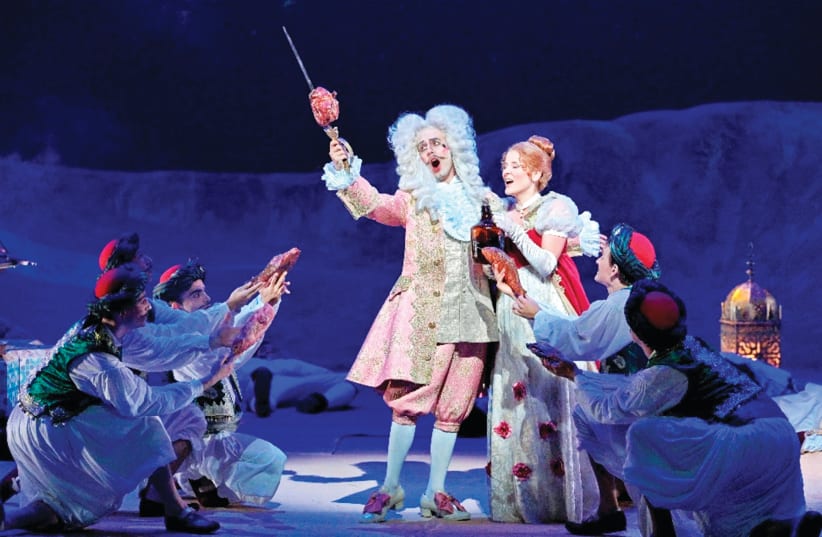Abducted by pirates employed by Mustafa, Bey of Algiers (Yair Polishook), Lindoro (Alasdair Kent) languishes three months separated from his beloved Isabella (Rachel Frenkel) and his native Italy. When she attempts to find him, Isabella, in turn, is also abducted by the same pirates. Mustafa tires of his wife Elvira (Yael Levita) and desires an Italian woman that “knows how to treat a macaroni,” as the Hebrew supertitles written by Israel Ouval inform us.
Outraged by the norms of the Orient, “where women are born to suffer,” Isabella desires to educate Elvira about her rights, twist Mustafa around her little finger, and rescue herself and her loved ones. Will she?
More than two centuries after its premiere, the Israeli Opera restaged this well-known opera as an innovative orientalist fantasy. When Kent sings of the misery of being separated from Frenkel, splendid animation of desert sands morph into her face behind him thanks to the talent of video designer Adam Lewensohn.
The eight pirates – skilled dancers and actors who carry a lot of weight on their shoulders – were outstanding in the Wednesday premiere in every scene. At the start we see this in the opening scene where they “allow” Frenkel and Kent to faint at their separation only to fall into well-practiced hands. We again see this in the charming scene where Frenkel and Oded Reich (in the role of Taddeo), are shown – at gunpoint – as a comical pirate binds the two slaves together in a performance that brings to mind the cartoon talent of Yosemite Sam. Kudos to choreographer Yoram Karmi for his achievement. The audience around me was delighted and laughed long and hard.
ROSSINI CREATED the opera as an orientalist fantasy at its inception. In her fantastic set design, Neta Haker simply gave it a visual language we would be able to understand in 2021. The large pyramid (Egypt), the sands (North Africa), and the palm trees create sets for the turban wearing pirates to run around in while the Europeans out-scheme them and regain liberty (the costume designer is Oren Dar).
Yes, there really was an Ottoman rank of Kaymakam (sub-governor), which Rossini employs for the aria “Viva il grande Kaimakan,” when Mustafa attempts to honor Taddeo with the rank to gain favor with Isabella. Yet Rossini offers as much insight into the orient as, say, The Mummy film-franchise educates us on ancient Egypt. Those upset over the crude orientalist (and chauvinistic) themes in the opera should be aware of this point.
The Italians quickly turn the tables by convincing Mustafa to become a Pappataci, a made-up title that compels those who hold it to eat, drink and sleep. Mustafa, who begins the opera by inviting us to “learn how to subdue women” from him – in the style of current alleged seduction masters – takes to the role like a duck to water. The Italians sail off as we are told that we had just seen the story of the “pretty Italian girl who outwitted men.” It is a crowd-pleasing Italian standard skillfully done.
While one can imagine Mustafa dressed like the late Libyan leader Muammar Gaddafi – who lectured 200 Italian models about Islam in 2009 while in Rome and gave each woman a copy of the Koran – in very different staging, this production also delivers.
L’Italiana in Algeri is at the Israeli Opera at 19 Shaul Hamelech Street. Performances are held on Monday July 12 at 8 p.m.; Wednesday July 14 at 8 p.m.; and Friday July 16 at 1 p.m. Tickets range from NIS 195 to NIS 445. The opera is 105 minutes long, without an intermission. The eight dancers mentioned are Ido Barak, Ohad Kalmy, Yiftach Mizrahi, Tamir Rakushkin and Amit Yardeni. Sung in Italian with English and Hebrew supertitles. Tickets can be bought online at www.israel-opera.co.il/eng/ or via phone (03) 692-7700.
